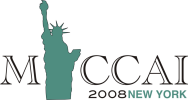MFCA-2008
|
MFCA-2008 is a satellite workshop
of MICCAI 2008 which is devoted to statistical and geometrical aspects of the
modeling of the variability of biological shapes. It will be held in New-York
on September
Scope of the workshop
The goal of computational anatomy is to analyze and to statistically model the anatomy of organs in different subjects. Computational anatomic methods are generally based on the extraction of anatomical features or manifolds which are then statistically analyzed, often through a non-linear registration. There are nowadays a growing number of methods that can faithfully deal with the underlying biomechanical behavior of intra-subject deformations. However, it is more difficult to relate the anatomies of different subjects. In the absence of any justified physical model, diffeomorphisms provide the most general mathematical framework that enforce topological consistency. However, working with this infinite dimensional space raises some deep computational and mathematical problems, in particular for doing statistics. Likewise, modeling the variability of surfaces leads to rely on shape spaces that are much more complex than for curves. To cope with these, different methodological and computational frameworks have been proposed (e.g. smooth left-invariant metrics, focus on well-behaved subspaces of diffeomorphisms, modeling surfaces using courants, etc.) The goal of the workshop is to foster interactions between researchers investigating the combination of geometry and statistics in non-linear image and surface registration in the context of computational anatomy from different points of view. A special emphasis will be put on theoretical developments, applications and results being welcomed as illustrations.
Topics
Contributions were
solicited in (but not limited to) the following areas:
· Riemannian and group theoretical methods
· Geometric measurements of the anatomy
· Advanced statistics on deformations and shapes
· Metrics for computational anatomy
· Statistics of surfaces
The program is composed of oral presentations selected by the peer-reviewed contributions of the participants.
Final program and Proceedings
Electronic
proceedings are now available on the web-site of the workshop at: http://www.inria.fr/sophia/asclepios/events/MFCA08/Proceedings/MFCA08_Proceedings.pdf
Best papers will
be selected for publication in a special issue of Journal of Mathematical
Imaging and vision.
08:45 - 09:00
Registration
09:00 - 09:10 Workshop
Introduction
09:10 - 10:25 Session 1:
Registration
|
09:10 |
|
|
09:35 |
|
|
10:00 |
10:25 - 10:45 Coffe
break
10:45 - 12:00 Session 2: Morphometry
|
10:45 |
|
|
11:10 |
|
|
11:35 |
12:00 - 13:10 Lunch (on
your own - not provided by the conference)
13:10 - 14:25 Session 3 : Building
Atlases
|
13:10 |
|
|
13:35 |
|
|
14:00 |
14:25 - 14:35 Short
break (no coffee)
14:35 - 15:50 Session 4: Surfaces
and Shapes spaces
|
14:35 |
|
|
15:00 |
|
|
15:25 |
15:50 - 16:10 Coffee
break
16:10 - 17:50 Session 5 : Statistics
on Manifolds and Shapes
|
16:10 |
|
|
16:35 |
|
|
17:00 |
|
|
17:25 |
17:50 - 18:00 Workshop
conclusion
Chairs
·
Xavier Pennec
(INRIA
·
Sarang Joshi (SCI,
Program committee
· Rachid Deriche (INRIA, France)
·
Ian L. Dryden (
·
Tom Fletcher (
·
James Gee (
·
Guido Gerig (
·
Polina Golland (CSAIL,
·
Stephen Marsland (
·
Michael I. Miller (
·
Mads Nielsen (IT
·
·
Bruno Pelletier (University
·
Jerry Prince (
·
Anand Rangarajan (
·
Daniel Rueckert (
·
Guillermo Sapiro (
·
Martin Styner (UNC
·
Anuj Srivastava (
·
Paul Thompson (
·
Alain Trouvé (
·
Carole Twinning (
·
William M. Wells III (CSAIL, MIT, and
Previous
workshop edition (MFCA'06): http://www.inria.fr/sophia/asclepios/events/MFCA06/
